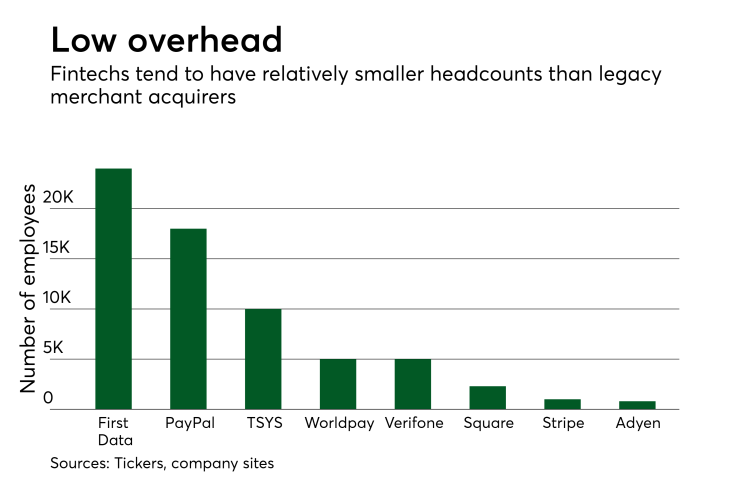Merchant acquirers have moved mountains to embrace software and e-commerce over the old model of selling point of sale hardware, but there are signs that transformation is not enough to please Wall Street and Silicon Valley investors.
"These new 'software' providers pose a threat as they take the categories where First Data or TSYS would have earned a large margin, and use that to subsidize their marketing/customer acquisition — with the long-term hope that merchants adopt many of their 'platform' products that can juice the [long term value] of a merchant on the platform," said Steve Sarracino, CEO of

For example,
Conversely,
"The market is saying it 'believes the story' around Adyen much more than it does First Data," said Ralph Dangelmaier, CEO of Bluesnap, a Waltham, Mass.-based business payment technology company. "And
Processors are aware of the trend toward mobile payments, e-commerce and omnichannel shopping, and have all embarked on multiyear strategies to build out software business lines that act in concert with payment processing. It's not uncommon for processors to even ask to software companies instead of processors during investor, earnings and media presentations.
First Data has used its Clover point of sale system to add merchant technology. It uses the brand to support partnerships with e-commerce companies such as an integration of Clover Go with
"The old organizations that were focused on swiping have done a nice job, but they aren't there yet," Dangelmaier said.
Even with the diversification, the mobile device itself still contributes to the challenges traditional acquirers will face.
"Where the legacy players will miss out is they assumed the payment or transaction would always occur at a physical location with hardware and as we see in China for example, it's happening on a user's device, a 'trusted endpoint' that quickly collects data about the person, personalizes the experience and enables the merchant to have a higher conversation," Activant Capital's Sarracino said. "If I'm a merchant, I want to pay less fees and have higher conversion."
Companies like Square, Shopify, Bolt and Shopkeep gained merchants' trust with nonexistent or super cheap hardware and have marched up market to provide a suite of integrated services, Sarracino said. "This will continue to happen as merchants come to the realization that they aren't tech companies and pick best-of-breed platforms that handle all operational functions around the transaction."





